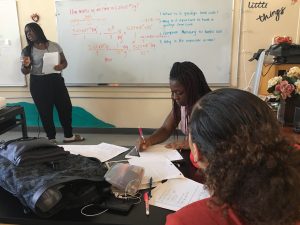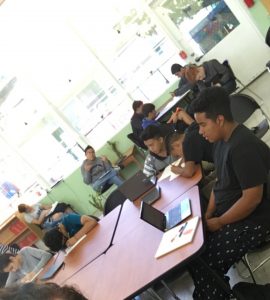Contributing Author: Marley Wertheimer
To guide your student along a successful path, it’s crucial that you form a team with his or her advisor in order to bridge the connection between home and school. Below are some questions that you can ask your child’s advisor to get the most out of your Family Conference:
Forming a Home-School Connection
To ensure success for your student, it’s best that students are hearing the same messages at home and at school.

The following questions will help you get to know your student’s advisor better and build a cooperative relationship together:
- What is the best way to contact you?
- How can I help?
- Do you have any volunteer opportunities at the school?
- Is there anything your classroom needs?
Academic Concerns
It’s best to detect academic struggles early on, and to then partner with your student’s school to get back on track. Asking the right questions about your adolescent’s academic needs will ensure he or she gets the necessary help.

These questions below will give you a clearer picture on how your student is doing and how to continually stay informed on what is going on in classrooms:
- What are my student’s goals?
- Do you notice my student struggling with anything in particular?
- What is a strength you’ve observed in my student?
- What do you suggest we work on at home to provide extra assistance?
- Can you please explain what these _________ mean?
- Will you please show me how to log in and check grades & assignments on Powerschool?
- Where can I find copies of my student’s study guides?
- Can you provide me with an after school tutoring schedule?
Social/Emotional Check-In
One role of the Silver Oak advisor is to meet with your adolescent every day. Some advisors also are your student’s teachers in class. The advisor witnesses many social interactions and emotional reactions that may not be displayed in your home.

Your student’s advisor is happy to provide you with meaningful information on how your student is behaving and responding both socially and emotionally. You can support your student even more by informing the advisor about something going on at home that may be impacting their mood or behavior. If necessary, the advisor can then share this information with your student’s teachers.
Furthermore, Silver Oak has added a Mental Services Program that provides both group and individual counseling to students (http://silveroakmontessori.org/mental-health-services/). Feel free to ask about this at your next Family Conference or via e-mail.
The questions below will help you better understand the social and emotional well-being of your adolescent at school:
- How is my student doing socially?
- Can I fill you in on what’s going on at home?
- Do you have any advice for how to handle _____________?
- Have you noticed my student doing _________________ while at school?
- What is the referral process like for mental health services?
Sensitive Situations
It’s never easy to broach a topic of concern. Another job of the advisor is to be your main line of communication between home and both teachers and administration at the school.
Using one of the following non-confrontational questions to bring up a sensitive situation will help make all parties feel more at ease in potentially uncomfortable conversations:
- May I share a concern?
- May I tell you about my student?
- Can you let me know a little more about your teaching methods?
- Could we set up a meeting together with the ____________ teacher?
- Can you fill me in about this situation?
The most important ingredient for a successful Family Conference is open communication. Be punctual and honor meeting times in order to show your student that you care about their academic achievement at school. Your involvement and approval is crucial to your adolescent’s success!
~~~
El Sistema Asesor y Conferencias Familiares: ¡Haga Preguntas!
Por Marley Wertheimer
Traducido Por Cloe Monleon
Para guiar a su estudiante a lo largo de una trayectoria exitosa, es crucial que usted forme un equipo con su consejero para tener la conexión entre el hogar y la escuela. A continuación se presentan algunas preguntas que usted puede pedirle al consejero (a) de su hijo para sacar el máximo provecho de su Conferencia Familiar:
Formar una conexión entre el hogar y la escuela
Para asegurar el éxito de su estudiante, es mejor que los estudiantes estén escuchando los mismos mensajes en casa y en la escuela.
Las siguientes preguntas le ayudarán a conocer mejor al asesor de su estudiante y así poder construir una relación de cooperación entre sí:
- ¿Cuál es la mejor manera de ponerse en contacto con usted?
- ¿Cómo puedo ayudar?
- ¿Tiene alguna oportunidad de voluntariado en la escuela?
- ¿Hay algo que tu salón necesita?
Preocupaciones Académicas
Lo mejor es detectar a tiempo cualquier problema que su estudiante tenga académicamente desde el principio y luego asociarse con la escuela de su estudiante para asegurarse que su estudiante vuelva a recuperarse académicamente. Hacer las preguntas correctas sobre las necesidades académicas de su adolescente asegurará que él o ella reciban la ayuda necesaria.
Las siguientes preguntas le darán una idea más clara de cómo está su estudiante y cómo mantenerse informado continuamente sobre lo que está pasando en las aulas:
- ¿Cuáles son los objetivos de mi estudiante?
- ¿Notas que mi estudiante está teniendo dificultad con algo en particular?
- ¿Qué fuerza has observado en mi estudiante?
- ¿Qué sugiere que trabajemos en su casa para brindarle asistencia adicional?
- ¿Puede explicar por favor qué significan esto _________?
- ¿Podría mostrarme cómo iniciar sesión para verificar los grados y asignaciones en Powerschool?
- ¿Dónde puedo encontrar copias de las guías de estudio de mi
Verificar Social / Emocional
Un papel del consejero (a) de Silver Oak es reunirse con su adolescente todos los días. Algunos asesores también son los maestros de su estudiante en clase. El consejero (a) testifica muchas interacciones sociales y reacciones emocionales que pueden no ser evidentes en su hogar. El asesor de su estudiante está feliz de proveerle información significativa sobre cómo su estudiante se está comportando y respondiendo social y emocionalmente.
Usted puede apoyar a su estudiante aún más informando al consejero sobre algo que sucede en el país que puede estar causando cierto efecto en su comportamiento. Si es necesario, el asesor puede compartir esta información con los maestros de su estudiante.
Además, Silver Oak ha agregado un Programa de Servicios Mentales que proporciona consejería individual a los estudiantes (http://silveroakmontessori.org/mental-health-services/). Siéntase libre de preguntarle a su asesor acerca de esto en su próxima Conferencia Familiar o por correo electrónico.
Las siguientes preguntas le ayudarán a entender mejor el bienestar social y emocional de su adolescente en la escuela:
- ¿Cómo está mi estudiante haciendo socialmente?
- ¿Puedo informarle sobre lo que ocurre en su casa?
- ¿Tiene algún consejo sobre cómo manejar _____________?
- ¿Ha notado que mi estudiante estaba haciendo __________mientras estaba en la escuela?
- ¿Cuál es el proceso de referencia como para los servicios de salud mental?
Situaciones sensibles
Nunca es fácil abordar un tema de preocupación. Otro trabajo del asesor es ser su principal línea de comunicación entre el hogar y los profesores y la administración en la escuela.
El uso de una de las siguientes preguntas no conflictivas para plantear una situación delicada ayudará a que todas las partes se sientan más a gusto en conversaciones potencialmente incómodas.
- ¿Puedo compartir una preocupación?
- ¿Puedo hablarle de mi estudiante?
- ¿Me puede decir un poco más acerca de sus métodos de enseñanza?
- ¿Podemos organizar una reunión junto con el maestro ____________?
- ¿Me puede informar sobre esta situación?
El factor más importante durante una Conferencia Familiar es la comunicación abierta. Sea puntual y honre las horas de reunión para mostrarle a su estudiante que usted se preocupa por sus logros académicos en la escuela. ¡Su participación y aprobación es crucial para el éxito de su adolescente!

